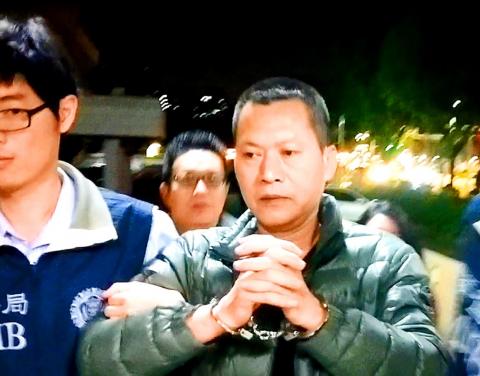The New Taipei City District Court yesterday ordered the detention of a Taiwanese businessman accused of attempting to recruit judicial and government officials to develop a spy network for China in Taiwan.
The suspect, Hung Chin-hsi (洪金錫), has been charged with violating the National Security Act (國家安全法) and detained with limited communication to prevent him from fleeing the country, prosecutors said.
New Taipei City authorities received a tip-off and Hung was placed under surveillance for more than a year, prosecutor Liu Wen-han (劉文瀚) said.

Photo: Chen Wei-tzu, Taipei Times
Hung was arrested in the city’s Tucheng District (土城) on Wednesday, Liu said.
A native of Macau, Hung came to work in Taiwan in the 1980s and later obtained Republic of China citizenship.
Hung returned to Macau in 2015 and set up business, which frequently involved traveling to Hong Kong and mainland China, where he is suspected to have been recruited by Chinese intelligence officials, Liu said.
A preliminary investigation showed that Chinese officials used money, along with favorable terms for doing business in China and other incentives, to lure Hung into working for them.
Hung was allegedly given the task of developing a spy network in Taiwan and recruiting influential Taiwanese to work for the Chinese government.
Hung allegedly tried to recruit a longtime friend, who is an officer at the Ministry of Justice’s Investigation Bureau (MJIB).
Starting in 2016, Hung allegedly invited the MJIB officer several times to visit China, offering the latter large sums of money and promising to introduce him to Chinese officials.
The MJIB officer reported the matter to his superiors, who launched an investigation.
The officer pretended to cooperate with Hung, accepting some valuable gifts, including gold coins, while recording conversations with Hung to gather evidence.
An investigator said it was worrying how Hung was instructed by his Chinese handlers to focus on “secondary targets,” which include university professors, journalists, media pundits and religious leaders, and recruit them to espouse pro-China unification talks and undermine the Taiwanese government’s position in the public discourse.

A magnitude 4.9 earthquake struck off Tainan at 11:47am today, the Central Weather Administration (CWA) said. The hypocenter was 32.3km northeast of Tainan City Hall at a depth of 7.3km, CWA data showed. The intensity of the quake, which gauges the actual effect of a seismic event, measured 4 in Tainan and Chiayi County on Taiwan's seven-tier intensity scale, the data showed. The quake had an intensity of 3 in Chiayi City and County, and Yunlin County, while it was measured as 2 in Kaohsiung, Nantou County, Changhua County, Taitung County and offshore Penghu County, the data showed. There were no immediate reports of

Weather conditions across Taiwan are expected to remain stable today, but cloudy to rainy skies are expected from tomorrow onward due to increasing moisture in the atmosphere, according to the Central Weather Administration (CWA). Daytime highs today are expected to hit 25-27°C in western Taiwan and 22-24°C in the eastern counties of Yilan, Hualien, and Taitung, data on the CWA website indicated. After sunset, temperatures could drop to 16-17°C in most parts of Taiwan. For tomorrow, precipitation is likely in northern Taiwan as a cloud system moves in from China. Daytime temperatures are expected to hover around 25°C, the CWA said. Starting Monday, areas

Taiwan has recorded its first fatal case of Coxsackie B5 enterovirus in 10 years after a one-year-old boy from southern Taiwan died from complications early last month, the Centers for Disease Control (CDC) said yesterday. CDC spokesman Lo Yi-chun (羅一鈞) told a news conference that the child initially developed a fever and respiratory symptoms before experiencing seizures and loss of consciousness. The boy was diagnosed with acute encephalitis and admitted to intensive care, but his condition deteriorated rapidly, and he passed away on the sixth day of illness, Lo said. This also marks Taiwan’s third enterovirus-related death this year and the first severe

A Taiwanese software developer has created a generative artificial intelligence (AI) model to help people use AI without exposing sensitive data, project head Huang Chung-hsiao (黃崇校) said yesterday. Huang, a 55-year-old coder leading a US-based team, said that concerns over data privacy and security in popular generative AIs such as ChatGPT and DeepSeek motivated him to develop a personal AI assistant named “Mei.” One of the biggest security flaws with cloud-based algorithms is that users are required to hand over personal information to access the service, giving developers the opportunity to mine user data, he said. For this reason, many government agencies and